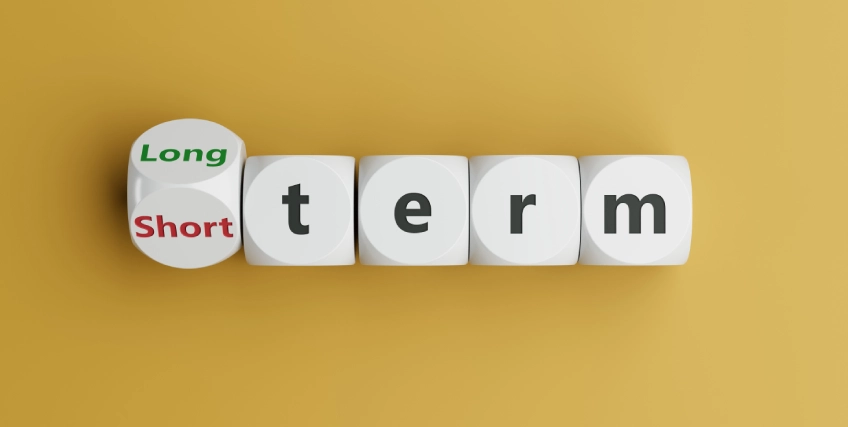Short-Term vs Long-Term Commercial Loans Which Is Right for Your Business
July 28, 2025 | Last Updated on: July 28, 2025

Every business can take its venture to the next level with the help of cash infusion, especially when the business is at the startup stage or in the middle of the growth stage. There are multiple ways for business owners to get capital for their business, such as crowdfunding and personal investment.
Small business financing helps you in managing payroll, expanding your operations, and pay for equipment. To make it clearer for you, there are two main types of commercial loan terms: short-term and long-term.
It is always better to understand the difference between the two before you start applying for commercial lending. This will help you to borrow the right amount, neither too much nor too less. Moreover, loan terms will also affect the amount you can borrow and the interest you can pay throughout the loan’s life.
In this article, you will learn about the difference between these two typical commercial loan terms to decide on the best option for yourself and understand the intricacies of each option.
Short-Term Loan vs. Long-Term Loan
Short commercial loan terms are a loan that you can borrow and repay over a short period of time, usually one to two years. These loans are often used for covering the immediate needs, like inventory or cash flow fluctuations.
Whereas long-term commercial loans come with multi-year repayment terms. These loans are used for covering substantial purchases, like a new facility or equipment, as compared to a short-term commercial loan.
A Closer Look at Short-Term Loans
One huge advantage of using short commercial loan terms is that it’s usually more accessible for small businesses. They may require any submission of collateral, and companies that have poor credit and financial statements can qualify for the same.
These commercial loan terms and rates are easier to apply for and can be finalized easily. If you have gotten the loan's approval, you may receive the funds quickly. This is more likely to happen if you are applying with a non-bank lender.
A short-term loan has high monthly payments, as you will be repaying the loan in a shorter time span.
When should you use short commercial loan terms
Short commercial loan terms are ideal for businesses that require quick cash for addressing the immediate need, without taking the burden of long-term loans.
You can use short commercial loan terms for the following options:
- Emergency repairs or equipment needs: When you need the finances for repairing or investing in important equipment.
- Inventory purchases: Restock your inventory when the demand is high.
- Seasonal expenses: To cover the fluctuation of sales or operations at a specific time of the year.
Pros of short-term loans
Below mentioned are the pros of using short commercial loan terms:
- Quick access to funds: Short-term loan products offer rapid access to funds, making them ideal for companies that require immediate funding for unforeseen expenses or new ventures.
- Easy qualification: Some of these may have less stringent commercial loan conditions and more lenient qualification requirements, making it easier for lower-scoring or newer businesses to qualify. The lender may request tax returns, and the loan-to-value ratios will be factored in when making the approval decision.
- Lower total interest payments: Since short-term loans are repaid in a short period, the overall interest paid is typically lower, especially with regular installments.
- Flexibility in cash flow: Short-term loans facilitate bridging cash flow shortages or cyclical slumps without long-term obligation. Others also utilize these loans to refinance existing debt with more favorable terms.
Cons of short-term loans
Since we all know everything comes with its pros and cons. Similarly, short commercial loan terms also have some advantages.
- Higher interest rates: Short commercial loan terms usually carry a high interest rate as they have a fast schedule of repayment, which makes them expensive over time.
- Frequent payments: Since there are shorter repayment terms, businesses will have to make regular payments, which can either be weekly or monthly, draining their cash flow.
- Smaller loan amounts: Since short commercial loan terms are obtained quickly, they usually offer small amounts as compared to long-term loans, which will not be enough for larger-scale investments.
- Risk of debt cycle: If your business is unable to repay the loan within the designated timeframe, you may end up with a debt service coverage ratio. This will result in higher fees, along with interest charges.
A Closer Look at Long-Term Loans
One significant benefit of longer-term capital is the ability to access higher funding amounts compared to short-term loans. Because repayment is spread out over time, monthly payments are generally more manageable under these commercial loan terms.
However, the loan application and loan process can be more demanding. Lenders often require strong credit, collateral, and sometimes a personal guarantee to qualify.
While longer-term loans may offer lower interest rates, borrowers often end up paying more in total interest over the long term commercial loans. The extended repayment schedule results in more payments, thereby increasing the overall cost of the loan, despite seemingly lower interest rates.
When should you use long-term commercial loans
When you use long commercial loan terms, you should know they are best suited for businesses that have a clear strategy of growth and have a stable financial position. You can consider this loan for the following purposes:
- Real estate investments: When you are purchasing a commercial property or expanding your facilities.
- Expansion projects: When you want to open in a new location, increase product lines, or scale operations.
- Large equipment purchases: When you are willing to finance the purchase of your expensive equipment or machinery necessary for your business, working capital.
Pros of long-term loans
Below mentioned are the pros of using long commercial loan terms:
- Lower interest rates: Long-term loans are usually the ones with low interest rates, as the repayment period is long, saving the money used for your business in the long run.
- Larger loan amounts: They provide access to huge capital, which can be used for purposes like investment, expansion, purchase of equipment, and hiring new staff.
- Longer repayment period: The longer the repayment term, the easier your monthly payments will be, which will make it easier for your business to manage its cash flow. In this way, your monthly payment will also not strain.
- Flexibility in use: When the repayment term is long and there is a large amount, businesses can utilize the funds for multiple purposes, like large-scale capital projects.
Cons of long-term loans
Below mentioned are some of the disadvantages of long commercial loan terms:
- Longer commitment: A long-term loan means a long-term financial burden, which can be problematic if your company is affected by market fluctuations or an economic recession.
- Longer Approval Process: These types of loans typically have a more extended approval period because they require detailed financial statements, tax returns, and other information necessary for most commercial loan programs.
- Potential for Debt Overhang: If the borrowed capital is not utilized strategically or growth does not meet expectations, your company might end up dealing with long-term debt that has strict commercial loan terms.
- Tighter Qualification Standards: Long-term loans typically require solid credit, established revenue, and substantial down payments. Lenders may also consider your collateral and financial history when determining loan eligibility.
What to Consider When Choosing Lender
Once you understand your commercial loan terms, the next step is to choose the right commercial lender. You may apply to nonbank lenders, credit unions, or banks.
Banks and credit unions may have better commercial loan rates and terms, such as fixed rates, but stricter qualification standards and more time to approve.
If it's difficult to qualify with a conventional lender, consider nonbank sources such as online lenders, lending platforms, or peer-to-peer sites. These commercial lenders typically have faster funding and more flexible qualifications, but often at higher interest levels.When comparing quotations, carefully check the fixed rate versus variable options, repayment terms, and eligibility requirements.
Additionally, verify if you qualify for SBA loans, which are partially government-backed and offer favorable terms. Always obtain quotes from multiple lenders to secure the best possible arrangement for your business.
- If there is a requirement for collateral
- Which lender is offering the lowest APR?
- Will you be receiving a fixed or variable interest rate
- Whether the lender charges any origination fees
- The loan amount the lender is offering
Which Is Better for Your Business?
The best commercial loan terms will depend on your specific business needs and goals. Short-term loans are useful for grabbing opportunities for generating short-term revenue or addressing an immediate financial barrier.
However, if you need to make a large purchase, such as acquiring another business or investing in commercial real estate, you should consider selecting long-term commercial loan terms. It is best for high investments that don’t require any immediate return on investment.
Whatever loan you are selecting, it’s necessary to find a lender who is experienced with small businesses. If you are working with a well-experienced lender, they will understand the needs and challenges of your business and help you find the funding required for your business.
Conclusion
Selecting between short and long commercial loan durations is entirely dependent on your company's financial standing, objectives, and timeline. Being aware of the standard commercial loan durations, including interest rates and payment schedules, is crucial for making a sound decision.
Always consider your credit score since it significantly impacts approval as well as the terms you're presented with.
A good credit score can help you secure better rates and larger loans. Whether you're financing immediate expenses or building for a significant expansion, choosing the right loan terms and lender is critical. Ensure the loan fits your cash flow and long-term business plans.
FAQs About Short-Term vs Long-Term Commercial Loan Terms
Is a short-term business loan better than a long-term business loan?
Short commercial loan terms require frequent repayments, usually weekly or monthly, so that it can align with the short term commercial loan. However, long commercial loan terms require you to pay quarterly, which has spread over the years.
Why do commercial banks prefer short-term loans?
Short-term business loans cater to short-term financial requirements with repayment terms usually lasting from 1 to 3 years. They are best suited for businesses, particularly owner-occupied businesses, that require paying short-term expenses. They typically have quicker approval times, and therefore, they are a popular choice for those requiring a quick injection of funds. Prompt loan repayments are essential for maintaining good standing and keeping the financial channel open.
When should a business use short-term and long-term funds?
A business should opt for short commercial loan terms when they need quick funds for inventory and save the option of long-term loans for investment purposes. Therefore, it is important for you to learn the differences between the two for selecting your option wisely.
Is it better to take a long-term or short-term loan?
A long-term loan would be a good choice if you're going to keep the asset for a while because it will generally have fixed payments and lower upfront costs amortized over the term. However, if you know that you will be selling or moving out of the asset in the short term, a short-term loan might be a better option. What is best truly does depend on your goal and financial situation, just be sure to consider any prepayment penalties that might be in place before you make your decision.
What is more profitable, short term or long-term?
It completely depends on the borrower what they require for their business. Some may prefer short-term loans while others may go with long-term loans for a steady approach.
Frequent searches leading to this page
Related Articles
Tips to Qualify for Unsecured Commercial Loans: Tips and Requirements
November 4, 2025
Economic Indicators to Watch: Predicting Movement of Current Commercial Loan Rates
October 10, 2025
Short-Term vs Long-Term Commercial Loans Which Is Right for Your Business
July 28, 2025
Term Loans are made by Itria Ventures LLC or Cross River Bank, Member FDIC. This is not a deposit product. California residents: Itria Ventures LLC is licensed by the Department of Financial Protection and Innovation. Loans are made or arranged pursuant to California Financing Law License # 60DBO-35839




